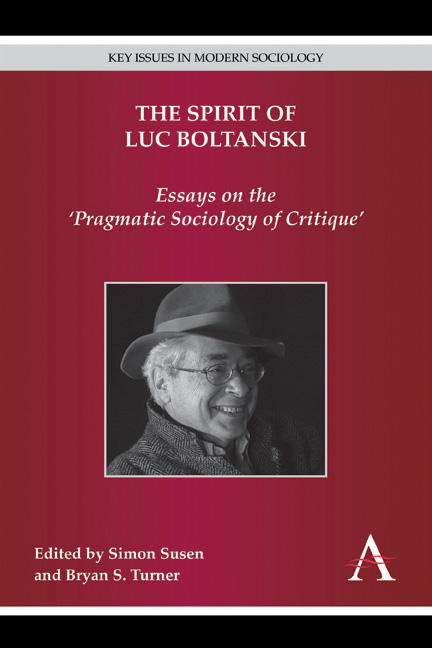Book contents
- Frontmatter
- CONTENTS
- List of Contributors
- Preface
- Part I Introductory Remarks
- Part II Luc Boltanski and (Post-) Classical Sociology
- Part III Luc Boltanski and Pragmatism
- 2 Did You Say ‘Pragmatic’? Luc Boltanski's Sociology from a Pragmatist Perspective
- 3 Why (Not) Pragmatism?
- 4 The Moral Idealism of Ordinary People as a Sociological Challenge: Reflections on the French Reception of Luc Boltanski and Laurent Thévenot's On Justification
- Part IV Luc Boltanski and Critique
- Part V Luc Boltanski and Critical Sociology
- Part VI Luc Boltanski and Political Sociology
- Part VII Luc Boltanski and Contemporary Issues
- Part VIII Luc Boltanski in Conversation
- Part IX Luc Boltanski and His Critics
- Index of Names
- Index of Subjects
3 - Why (Not) Pragmatism?
from Part III - Luc Boltanski and Pragmatism
Published online by Cambridge University Press: 05 December 2014
- Frontmatter
- CONTENTS
- List of Contributors
- Preface
- Part I Introductory Remarks
- Part II Luc Boltanski and (Post-) Classical Sociology
- Part III Luc Boltanski and Pragmatism
- 2 Did You Say ‘Pragmatic’? Luc Boltanski's Sociology from a Pragmatist Perspective
- 3 Why (Not) Pragmatism?
- 4 The Moral Idealism of Ordinary People as a Sociological Challenge: Reflections on the French Reception of Luc Boltanski and Laurent Thévenot's On Justification
- Part IV Luc Boltanski and Critique
- Part V Luc Boltanski and Critical Sociology
- Part VI Luc Boltanski and Political Sociology
- Part VII Luc Boltanski and Contemporary Issues
- Part VIII Luc Boltanski in Conversation
- Part IX Luc Boltanski and His Critics
- Index of Names
- Index of Subjects
Summary
Theories thus become instruments, not answers to enigmas, in which we can rest. We don't lie back upon them, we move forward, and, on occasion, make nature again over by their aid. Pragmatism unstiffens all our theories, limbers them up and sets each one at work.
William James, ‘What Pragmatism Means’ (1922 [1907])Is Luc Boltanski a pragmatist thinker? In some current French debates, this question is not a rhetorical one. More than ten years after Pierre Bourdieu's death, and about thirty years after the founding of the Groupe de Sociologie Politique et Morale (GSPM) with Laurent Thévenot and Michael Pollak at the École des Hautes Études en Sciences Sociales in Paris, the critical stance towards Bourdieusian sociology seems to be increasingly linked to the question of whether or not one may be described as a pragmatist.
At the end of the 1980s, being ‘pragmatic’ permitted a couple of former students and collaborators of Bourdieu to create a fruitful and widely discussed ‘sociology of critique’, in contrast with Bourdieu's ‘critical sociology’. It is no secret that this so-called ‘pragmatic sociology of critique’ – or, if one prefers, simply ‘pragmatic sociology’ – was not explicitly referring to the classical American pragmatism founded by Charles Sanders Peirce, William James, George Herbert Mead, and John Dewey. This has been largely admitted by members of the GSPM (Dodier, 2005; Thévenot, 2011). Interestingly, no one seems to care less about it than the most emblematic figure of the group, Boltanski himself. Though internationally recognized as one of the founders of French neo-pragmatism, Boltanski's references to this philosophy of knowledge and action are scattered and appear anything but systematic. Known for his scepticism towards theoreticist intellectualism, this is, after all, not surprising. Does this mean, however, that his sociology is, after all, not pragmatist (Stavo-Debauge, 2012)? Moreover, what – if anything – can we learn from this question?
- Type
- Chapter
- Information
- The Spirit of Luc BoltanskiEssays on the 'Pragmatic Sociology of Critique', pp. 129 - 152Publisher: Anthem PressPrint publication year: 2014

